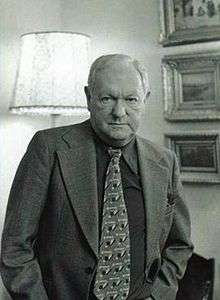Mark Fradkin
Mark Grigoryevich Fradkin (Марк Григорьевич Фрадкин, May 4, 1914 in Vitebsk, Russian Empire, now Belarus – April 4, 1990 in Moscow, USSR) was a Soviet composer, author of numerous popular songs (many of which were co-written with poet Yevgeny Dolmatovsky) and musical scores for forty films. In 1979, Mark Fradkin received the USSR State Prize and, in 1985, he was granted the status of the People’s Artist of the USSR.[1][2]
Mark Grigoryevich Fradkin | |
|---|---|
 | |
| Born | Марк Григорьевич Фрадкин May 4, 1914 |
| Died | April 4, 1990 (aged 75) Moscow, USSR |
| Resting place | Novodevichy Cemetery, Moscow |
| Occupation | composer, songwriter, memoirist |
| Years active | 1940s – 1990 |
| Title | People's Artist of the USSR (1985) |
| Awards | USSR State Prize (1979) |
Biography
Mark Fradkin was born in Vitebsk, Russian Empire (now Belarus), to a family of doctors. In the 1920s, having graduated from the technological secondary school, Mark joined a clothing factory in Vitebsk. After two years there, he joined the Third Belorussian Theatre as an actor (later musical administrator). In 1934, he enrolled in the Leningrad Theatre Institute where he started writing music. In 1938-1939, he studied in the Belorussian Conservatory under the guidance of Professor Aladov while working as an actor in the Minsk Children Theater (ТЮЗ).[1]
In 1939, Fradkin was mobilized into the Soviet Army. As a conductor of the Kiev Red Army orchestra, he started co-writing songs with poet Yevgeny Dolmatovsky. In 1943, still on an endless front-line tour performing for Soviet fighters, Fradkin was awarded the Order of the Red Star. In 1944, he became a member of the Soviet Union of Composers and moved to Moscow. Among his popular war-time songs were "The Dnieper Song", "Chance Meeting Waltz", "A Street in Bryansk". After the war, he had a string of hits ("Welcome to Saratov", "The Waiting", "Birches", "We Were Just Neighbours", "Beyond the Factory Gate", "Komsomol Volunteers", "The Song of Tenderness", "As Years Fly By", "Farevell You Doves", "As Volga Flows") performed by the stars of the Soviet popular music, like Mark Bernes, Lyudmila Zykina, Ruzhena Sikora, Eduard Hil, Iosif Kobzon. One of the better known Fradkin songs of the 1970s, a war-themed epic, "For Another Guy" (lyrics by Robert Rozhdestvensky), brought Lev Leshchenko the First Prize at the 1972 Sopot International Song Festival. In 1979, Mark Fradkin was awarded the USSR State Prize and, in 1985, the prestigious People's Artist of the USSR status. His book of memoirs, My Biography, was published in 1974.
Mark Grigoryevich Fradkin died on April 4, 1990. He was buried at the Novodevichye Cemetery in Moscow.[3]
Family
Mark Fradkin's father, Grigory Konstantinovich Fradkin, a doctor in Kursk, was executed by the White Army troops retreating from the city in 1920. His mother, Yevgenya Mironovna Fradkina (née Shagalova), a doctor too, was a victim of the Holocaust: along with many other Vitebsk Jews, she was killed by the German Nazis during World War II.[2]
Selected filmography
- They Were the First (1956)
- A Simple Story (1960)
- Songs of the Sea (1970)
References
- "Mark Fradkin". Narod_ru. Retrieved 2014-01-13.
- "Mark Fradkin". Sovetskaya Muzyka. Retrieved 2014-01-13.
- "Fradkin, Mark Grigoryevich". www.kino-teatr.ru. Retrieved 2014-01-13.
External links
- Mark Fradkin. In Memoriam, Romantika Romansa. TV Kultura, Russia
- Mark Fradkin at Find a Grave